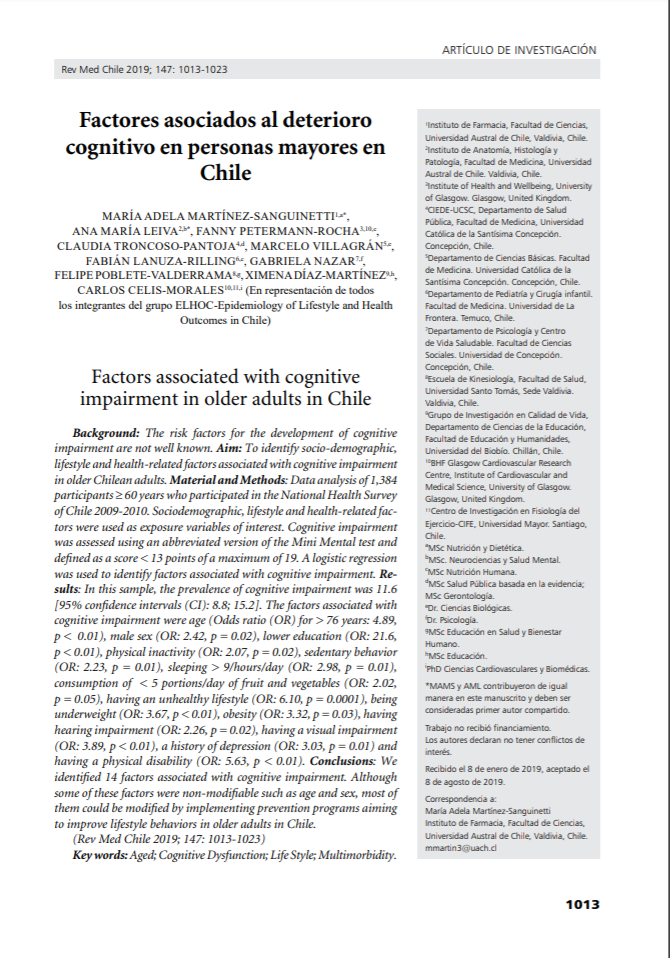Factors associated with cognitive impairment in older adults in Chile

Fecha
2019Autor
Celis-Morales, Carlos [Univ Mayor, CIFE, Santiago, Chile]
Adela Martínez-Sanguinetti, Maria
María Leiva, Ana
Petermann-Rocha, Fanny
Troncoso-Pantoja, Claudia
Villagrán, Marcelo
Lanuza-Rilling, Fabian
Nazar, Gabriela
Poblete-Valderrama, Felipe
Díaz-Martínez, Ximena
Ubicación geográfica
Notas
HERRAMIENTAS
Acceda a títulos restringidos
¿Cómo descargar?Resumen
Background: The risk factors for the development of cognitive impairment are not well known. Aim: To identify socio-demographic, lifestyle and health-related factors associated with cognitive impairment in older Chilean adults. Material and Methods: Data analysis of 1,384 participants >= 60 years who participated in the National Health Survey of Chile 2009-2010. Sociodemographic, lifestyle and health-related factors were used as exposure variables of interest. Cognitive impairment was assessed using an abbreviated version of the Mini Mental test and defined as a score < 13 points of a maximum of 19. A logistic regression was used to identify factors associated with cognitive impairment. Results: In this sample, the prevalence of cognitive impairment was 11.6 [95% confidence intervals (CI): 8.8; 15.2]. The factors associated with cognitive impairment were age (Odds ratio (OR) for > 76 years: 4.89, p < 0.01), male sex (OR: 2.42, p = 0.02), lower education (OR: 21.6, p < 0.01), physical inactivity (OR: 2.07, p = 0.02), sedentary behavior (OR: 2.23, p = 0.01), sleeping > 9/hours/day (OR: 2.98, p = 0.01), consumption of < 5 portions/day of fruit and vegetables (OR: 2.02, p = 0.05), having an unhealthy lifestyle (OR: 6.10, p = 0.0001), being underweight (OR: 3.67, p < 0.01), obesity (OR: 3.32, p = 0.03), having hearing impairment (OR: 2.26, p = 0.02), having a visual impairment (OR: 3.89, p < 0.01), a history of depression (OR: 3.03, p = 0.01) and having a physical disability (OR: 5.63, p < 0.01). Conclusions: We identified 14 factors associated with cognitive impairment. Although some of these factors were non-modifiable such as age and sex, most of them could be modified by implementing prevention programs aiming to improve lifestyle behaviors in older adults in Chile.
URI
http://dx.doi.org/10.4067/S0034-98872019000801013http://repositorio.umayor.cl/xmlui/handle/sibum/6599
Coleccion/es a la/s que pertenece:
Si usted es autor(a) de este documento y NO desea que su publicación tenga acceso público en este repositorio, por favor complete el formulario aquí.